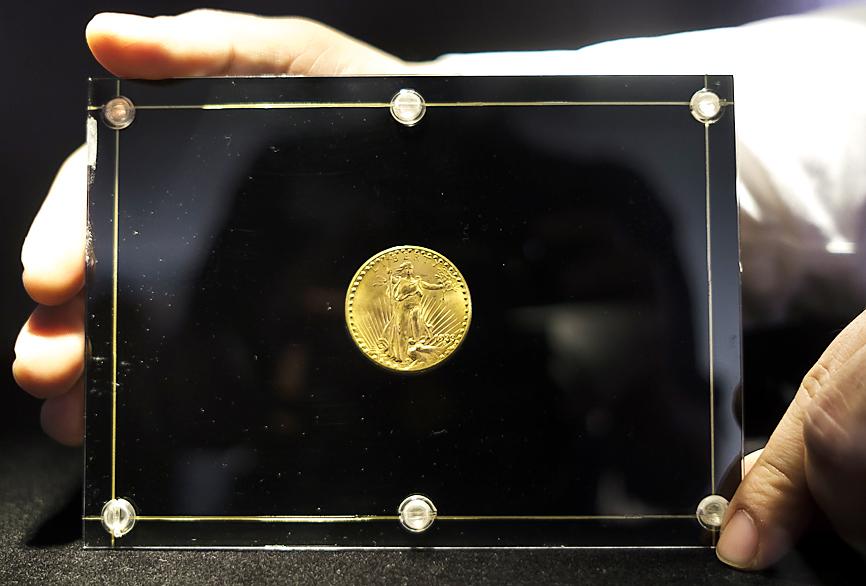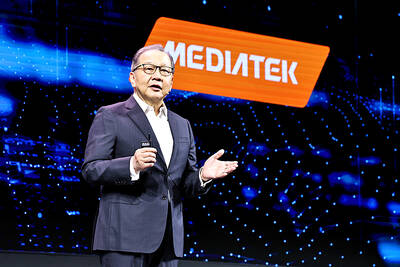Gold was not much changed as US Treasury yields rebounded.
Yields are rising again, and US President Joe Biden on Thursday signed a US$1.9 trillion COVID-19 pandemic relief bill into law, allowing aid to flow to individuals, businesses and local governments.
Meanwhile, applications for US jobless benefits fell more than forecast to the lowest since early November last year as COVID-19 vaccinations accelerated and states eased more business restrictions.

Photo: EPA-EFE
DEMAND AFFECTED
Rising yields have played havoc on the price of gold, which touched a record high in August. Rates have climbed as increased economic aid stokes inflation concerns, hampering demand for bullion because it does not offer interest.
Prospects for faster economic growth are also denting demand for the metal as a haven, helping send prices down more than 9 percent this year.
“Bond vigilantes continue to view the massive Biden US$1.9 trillion stimulus bill with deep dread concern, both with massive supply in the pipeline as well as inflation pressures,” said Tai Wong, head of metals derivatives trading at BMO Capital Markets. “Selling in bonds is keeping yields elevated and has taken gold rather smartly off overnight highs.”
POTENTIAL TAILWIND
While the roll out of COVID-19 vaccines has seen diminishing investor interest for the traditional haven, Biden’s economic package could give a huge “tailwind” to gold in the long term, Commerzbank AG analyst Carsten Fritsch said.
“The inflation risks are growing at the same time, as handing out US$1,400 to nearly every American and topping up and extending unemployment benefits are likely to massively fuel consumption,” Fritsch said.
The European Central Bank pledged to ramp up buying government debt in coming months in a bid to a contain rising bond yields that threaten to derail the region’s economic recovery.
Spot gold added 0.1 percent to US$1,723.75 an ounce, up 1.69 percent for the week. Gold for April delivery declined US$2.80 to US$1,719.80 an ounce, but rose 1.25 percent from a week earlier.
Other commodities:
‧ Silver for May delivery fell US$0.28 to US$25.91 an ounce and May copper remained unchanged at US$4.14 a pound.
Additional reporting by AP and Reuters, with staff writer

Japanese Prime Minister Sanae Takaichi has talked up the benefits of a weaker yen in a campaign speech, adopting a tone at odds with her finance ministry, which has refused to rule out any options to counter excessive foreign exchange volatility. Takaichi later softened her stance, saying she did not have a preference for the yen’s direction. “People say the weak yen is bad right now, but for export industries, it’s a major opportunity,” Takaichi said on Saturday at a rally for Liberal Democratic Party candidate Daishiro Yamagiwa in Kanagawa Prefecture ahead of a snap election on Sunday. “Whether it’s selling food or

CONCERNS: Tech companies investing in AI businesses that purchase their products have raised questions among investors that they are artificially propping up demand Nvidia Corp chief executive officer Jensen Huang (黃仁勳) on Saturday said that the company would be participating in OpenAI’s latest funding round, describing it as potentially “the largest investment we’ve ever made.” “We will invest a great deal of money,” Huang told reporters while visiting Taipei. “I believe in OpenAI. The work that they do is incredible. They’re one of the most consequential companies of our time.” Huang did not say exactly how much Nvidia might contribute, but described the investment as “huge.” “Let Sam announce how much he’s going to raise — it’s for him to decide,” Huang said, referring to OpenAI

CHIP HANG-UP: Surging memorychip prices would deal a blow to smartphone sales this year, potentially hindering one of MediaTek’s biggest sources of revenue MediaTek Inc (聯發科), the world’s biggest smartphone chip designer, yesterday said its new artificial intelligence (AI) chips used in data centers are to account for 20 percent of its total revenue next year, as cloud service providers race to deploy AI infrastructure to meet voracious demand. MediaTek is believed to be developing tensor processing units for Google, which are used in AI applications. While it did not confirm such reports, MediaTek said its new application-specific IC (ASIC) business would be a new growth engine for the company. It again hiked its forecast for the addressable ASIC market to US$70 billion by 2028, compared

SIGNS OF STABILITY: With US tariff risks to GDP subsiding, reliable economic conditions are expected to reinforce the bank operating environment, Fitch said Fitch Ratings has upgraded the outlook for Taiwan’s banking sector to “neutral” from “deteriorating,” citing a tariff agreement with the US that has reduced uncertainty in Taiwan’s macroeconomic environment and stabilized financial performance. The US on Jan. 15 agreed to lower tariffs on Taiwanese goods from 20 percent to 15 percent, without stacking them on existing most-favored-nation rates, placing Taiwan on equal footing with major competitors such as Japan, South Korea and the EU. The deal also grants Taiwan-made semiconductors and related products most-favorable-nation treatment under Section 232 of the US Trade Expansion Act. Under the agreement, Taiwanese semiconductor, electronics manufacturing service, artificial